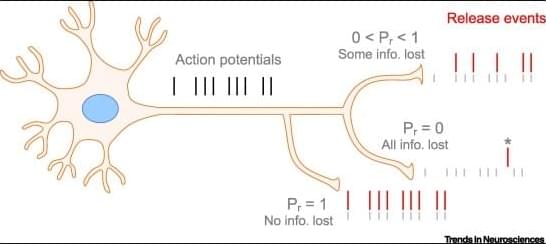Perioperative morbidity and mortality were reduced with off-pump vs on-pump coronary artery bypass grafting, though survival evened out over the long term.




More often than not, action potentials fail to trigger neurotransmitter release. And even when neurotransmitter is released, the resulting change in synaptic conductance is highly variable. Given the energetic cost of generating and propagating action potentials, and the importance of information transmission across synapses, this seems both wasteful and inefficient. However, synaptic noise arising from variable transmission can improve, in certain restricted conditions, information transmission.
At the recent “Jesus on Trial” Christian apologetics mega-seminar, resurrection expert Dr. Gary Habermas gave a two-hour lecture called “Evidence for the Resurrection that Changed a Generation of Scholars”. What is this evidence, and did it also change a generation of skeptics? Jesus on Trial Conference — https://jesusontrialconf.com Support Paulogia at / paulogia http://www.paypal.me/paulogia https://www.amazon.ca/hz/wishlist/ls/.… Paulogia Audio-Only-Version Podcast https://paulogia.buzzsprout.com Follow Paulogia at
/ paulogia0
/ paulogia0
/ discord.

Lawrence Livermore National Laboratory’s National Ignition Facility (NIF) is the hottest place on Earth for the briefest of moments during an experiment. Now, it can be one of the brightest places thanks to the Advanced Radiographic Capability (ARC), NIF’s laser-within-a-laser. How this is possible and how it’s measured is detailed in a paper in Physics of Plasmas titled “Development and scaling of MeV X-ray radiography at NIF-ARC.”
“This paper is a culmination of 13 NIF experiments over five years of data gathering, analyzing experiments, modeling and refining diagnostics,” said LLNL physicist Dean Rusby, the paper’s first author. “We’re able to create and measure an MeV X-ray source that can’t be done anywhere else on Earth.”


Claude appears to be having a major outage, with elevated errors reported across all platforms.
The incident was flagged on March 2, 2026 at 11:30 UTC, and it’s impacting users broadly rather than being limited to one app or region.
According to Anthropic’s status updates, the first “Investigating” notice went out at 11:49 UTC, followed by a 12:06 UTC update saying the team was still investigating.



Now online! The cryo-EM structures of Andes hantavirus (ANDV) glycoprotein tetramers, dimers of tetramers, and ADI-65534 Fab complexes on eVLPs unveil the molecular basis of New World hantavirus glycoprotein architecture, acid-induced membrane fusion, and antibody-mediated neutralization. Immunization with repRNA encoding ANDV-VLPs elicits high neutralizing-antibody titers.